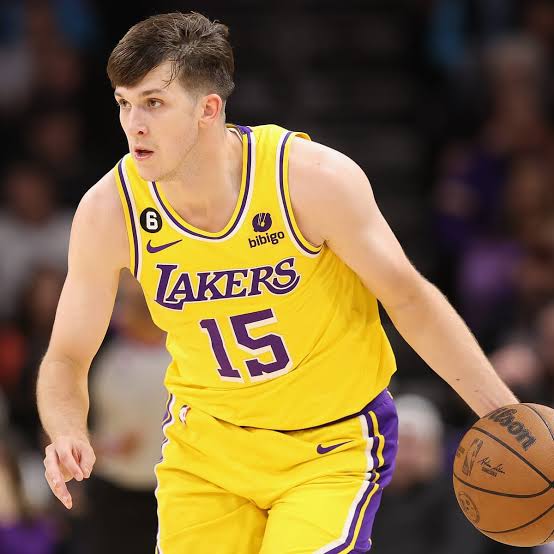OUTBURST: Lakers’ Austin Reaves Makes Admission About ‘White Guy Stigma’ in NBA
In a moment of raw honesty that has sparked widespread conversation across the basketball world, Los Angeles Lakers guard Austin Reaves has opened up about what he calls the “white guy stigma” in the NBA — a candid revelation that pulls back the curtain on some of the league’s lingering stereotypes and challenges faced by white American players.
In a recent sit-down podcast interview with All The Smoke, hosted by former NBA stars Matt Barnes and Stephen Jackson, Reaves didn’t hold back. The 26-year-old rising star, known for his fearless play and surprising rise from undrafted status to becoming a key piece of the Lakers’ roster, touched on a topic many in the NBA community often avoid.
“You Gotta Prove You Belong — Twice”
“Coming into the league, there’s this automatic assumption,” Reaves said. “You’re a white dude, you’re not athletic, you’re a shooter, you’re probably a liability on defense. It’s like you’re playing from behind before you even touch the floor.”
Reaves’ comments struck a nerve — not just because of who said them, but because of how rarely such sentiments are voiced publicly by players still in the league.
The Arkansas native, who went undrafted in 2021, worked his way into the Lakers’ rotation through gritty performances, high basketball IQ, and clutch moments in the postseason. Despite being a standout at the collegiate level with stints at Wichita State and Oklahoma, Reaves admitted that he’s constantly had to overcome preconceived notions that come with being a white American player in a league where racial dynamics, stereotypes, and expectations continue to play a subtle — but powerful — role.
More Than a Shooter
“Every scouting report starts with the same line: ‘shooter, smart, hustle guy.’ Like we can’t be explosive, or create, or clamp down on defense,” Reaves said. “It gets old. You get tired of having to prove you’re more than that every single game.”
Yet prove it he has.
This season, Reaves has averaged 15.7 points, 5.1 assists, and 4.2 rebounds per game while shooting over 46% from the field. He’s become one of the Lakers’ most reliable players, often serving as a secondary playmaker and bringing energy on both ends of the floor.
Lakers head coach Darvin Ham praised Reaves for his maturity and growth, stating in a postgame presser earlier this year, “He plays with an edge. He doesn’t back down. He’s earned everything he’s got, and he’s still getting better.”
Reactions Around the League
Reaves’ comments have drawn reactions from players, analysts, and fans alike — with many applauding his willingness to speak out about a topic that is often brushed under the rug in a league that prides itself on diversity but still wrestles with its own biases.
NBA veteran JJ Redick, now a prominent analyst, weighed in on ESPN’s First Take this morning. “What Austin said is real,” Redick said. “It’s something I’ve dealt with my entire career. The moment you step on the court, there’s a perception you have to fight against. And honestly, it can be exhausting. But I respect the hell out of him for saying it.”
Others echoed similar sentiments, noting that while the league is more inclusive than ever, subconscious biases — whether in media narratives, fan perceptions, or even coaching decisions — can impact how players are viewed and valued.
A League-Wide Conversation
Reaves emphasized that his intent wasn’t to complain, but to spark dialogue.
“I’m not saying I have it harder than anyone else,” he clarified. “I’m saying we all deal with stuff. And part of growing the game is being real about what that stuff is.”
He also noted that the stigma isn’t just external — it can affect how players carry themselves.
“When you’re labeled a certain way from the jump, you start playing within that box. And it limits your game, mentally more than anything. I had to break out of that.”
More Than Just Basketball
Reaves’ remarks resonate beyond basketball. They touch on a broader cultural conversation about race, stereotypes, and identity in professional sports — and how players, regardless of background, are shaped by the narratives around them.
For Reaves, though, the mission remains simple: let his game speak.
“End of the day, I just hoop. If you respect that, cool. If not, I’ll make you respect it.”
Looking Ahead
With the Lakers fighting for playoff position in a tightly contested Western Conference, Reaves’ voice — both on and off the court — is growing louder. And if his play continues to back up his words, there’s little doubt he’ll not only continue defying the so-called stigma — he may redefine it altogether.
In a league that often celebrates authenticity but rarely hears these kinds of admissions from its active stars, Austin Reaves has done more than spark a conversation — he’s owned his truth, and in doing so, invited the NBA world to take a closer look at the stories it tells.





























